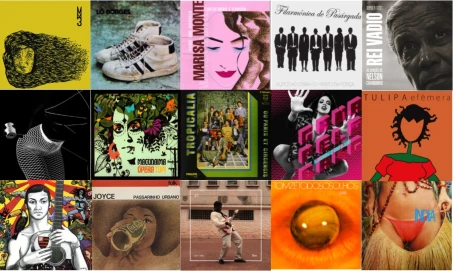As much as a pain as it felt at the time, I preferred it when year-end lists didn’t print until February or March. Gave you time to suss through late-year releases and hear meditate a bit before compiling your own list. These days publications are putting out lists before a year even ends. So, although the new cycle has left 2019 behind, I’m finally ready to put out a list of what I liked most last year. And, hey, it’s my 100th post. So that’s fun.
My two favorite Brazilian albums on the list below are actually 2018 releases. So, yeah, it was a down year. What’s more, there’s not a single full A, much less A+, record in the bunch. But that’s not to say these are not great, or at least pretty great, records. If nothing sounded ear-shattering or life-altering, well I feel lucky to get one or two of those from worldwide in any year.* So I’ll happily make do with the thoroughly enjoyable pleasures of Brazilian albums that have held up to dozens of listens each, many of which didn’t just make good sounds, but upped the political content for dangerous times in a homeland under rightwing siege.
Plus, it might be the most sonically diverse list I’ve assembled: hip hop, jazz rap, northeast meets central Africa, Krautrock revivalism, neo-samba, alt-rock. Three years into this project I continue to be surprised how deep and varied Brazil’s musical culture is, and how much American and Western engagement just nips the tip of the iceberg.
There is one notable gap, however. For the first time since 2010, not a single Clube da Encruza record made my year-end top ten. Douglas Germano is something of an affiliate member, but it’s not quite the same. It wasn’t because of bad product, but rather a lack of options: the Clube members and their side projects were quiet in the studio even as they maintained relentless touring schedules. I would have loved to see that Metá Metá/Passo Torto show, or Romulo Fróes tour interpreting Caetano Veloso’s Transa. But I don’t live in Brazil. The good news is, spoiler alert, one of them has already released a fine album this year.
And Latin music? I had plans of deeper engagement this past year, but life upsets plans, so I didn’t dig in as much as I wanted to. I still found several 2019 albums that made my ears perk up, so I’ll do a list there, too. As usual, I tend to feel the Brazilian stuff more because I devote so much more time to it, but for a change of pace, these albums more than merely serve the purpose. (I haven’t reviewed the Rodrigo y Gabriela one yet. Consider that a preview of coming attractions.)
*If you are interested, those two albums this year were James Brandon Lewis’ An Unruly Manifesto—my favorite jazz album of the decade—and Billy Woods’ and Kenny Segal’s Hiding Places, where creepy ssounds and lyrical detail keep drawing me in further. Billie Eilish wasn’t far behind. Don’t underestimate her.
Favorite Brazilian Albums 2019
- Dona Onete, Flor da Lua (2018) (A-)
- Ana Frango Eletríco, Mormaço Qeuima (2018) (A-)
- Douglas Germano, Escumalha (A-)
- BaianaSystem, O Futuro Não Demora (A-)
- Rincon Sapiência, Mundo Manicongo: Dramas, Danças e Afroreps (A-)
- Ana Frango Eletríco, Little Electric Chicken Heart (A-)
- Karina Buhr, Desmanche (A-)
- Leo Gandelman & Baco Exu do Blues, Hip Hop Machine Series #6 (A-)
- Ema Stoned, Yantra and Makoto Kawabata, Phenomena (A-)
- Siba, Coruja Muda (B+)
Honorable Mentions (alphabetical):
- Akira Presidente, Nandi (B+)
- DEAFKIDS, Metaprogamação (B+)
- Leo Gandleman & BNegão, Hip Hop Machine Series #7 (B+)
- MC Tha, Rito de Passé (B+)
- Dona Onete, Rebujo (B+)
- Juliana Perdigão, Folhuda (B+)
- Thiago Pethit, Mal dos Trópicos (Queda & Ascenção de Orfeu da Consolação) (B+)
- Tássia Reis, Próspera (B+)
- Tribalistas, Tribalistas Ao Vivo (B+)
If I included compilations, two fine, recent ones that would make the list are Levanta Poeira: Afro-Brazilian Music & Rhythms 1976-2016 in the top ten and Jambú (E Os Míticos Sons da Amazônia), in the honorable mentions.
Favorite Latin Albums 2018
- iLe, Almadura (A-)
- Los Wembler’s de Iquitos, Vision del Ayahuasca (A-)
- La Yegros, Suelta (A-)
- Daymé Arocena, Sonocardiogram (A-)
- Las Yumbeñas, Yumbotopía (A-)
- Rodrigo y Gabriela, Mettavolution (A-)
- Yapunto, Yapunto (B+)
- Fumaça Preta, Pepas (B+)
- Femina, Perlas & Conchas (B+)
- Nicola Cruz, Siku (B+)
Honorable Mentions (alphabetical):
- Canalón de Timbiquí, De Mar y Río (B+)
- Newen Afrobeat, Curiche (B+)
Oh, and I’m not quite done with the year yet. Expect something 2019 related around March 1.
